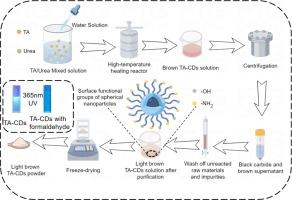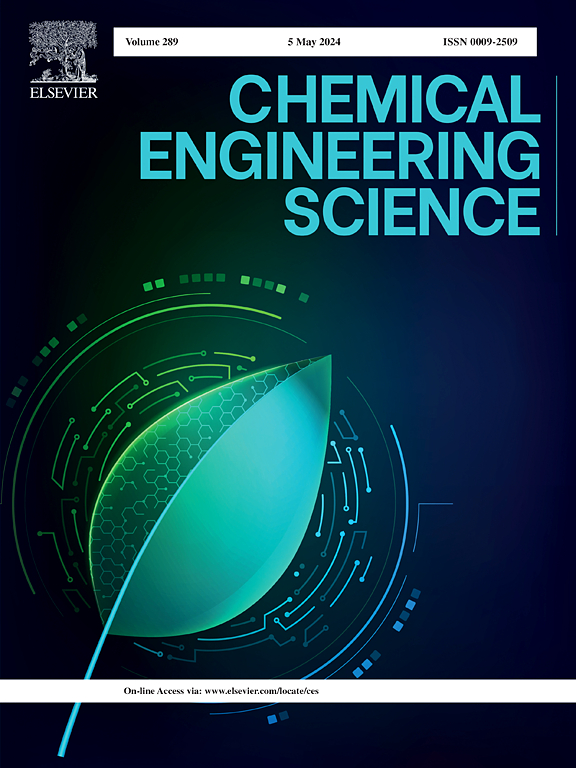Formaldehyde detection based on tannin carbon dots
IF 4.1
2区 工程技术
Q2 ENGINEERING, CHEMICAL
引用次数: 0
Abstract
With the acceleration of industrialization, formaldehyde detection is becoming increasingly important. Numerous challenges persist about sensitivity and safety in the field of formaldehyde detection. This paper developed a formaldehyde detection material based on carbon dots, and effectively improved the sensitivity, safety and convenience of detection. Specifically, tannin acid (TA) was utilized as the carbon source and urea as the nitrogen source to prepare tannin/urea carbon dots (TA-CDs) with excellent performance. The fluorescence intensity of the carbon dot solution gradually decreased with increasing formaldehyde concentration. A significant linear relationship (R2 = 0.99462) was observed in the range of 0.00015–0.035 mmol/L, with a practical formaldehyde detection limit of 0.296 μmol/L. This paper utilizes natural poly-phenol compound TA as the raw material, which boasts unique characteristics and low cost. TA-CDs prepared from it are abundant in surface defects and active sites, exhibiting significant advantages in formaldehyde detection and possessing immense application potential.


基于单宁碳点的甲醛检测
随着工业化进程的加快,甲醛检测变得越来越重要。在甲醛检测领域,灵敏度和安全性仍面临诸多挑战。本文开发了一种基于碳点的甲醛检测材料,有效提高了检测的灵敏度、安全性和便利性。具体而言,以单宁酸(TA)为碳源,尿素为氮源,制备出性能优异的单宁/尿素碳点(TA-CDs)。随着甲醛浓度的增加,碳点溶液的荧光强度逐渐降低。在 0.00015-0.035 mmol/L 范围内观察到明显的线性关系(R2 = 0.99462),实际甲醛检测限为 0.296 μmol/L。本文以天然多酚化合物 TA 为原料,该化合物具有独特的特性且成本低廉。以其为原料制备的 TA-CD 具有丰富的表面缺陷和活性位点,在甲醛检测方面具有显著优势,应用潜力巨大。
本文章由计算机程序翻译,如有差异,请以英文原文为准。
求助全文
约1分钟内获得全文
求助全文
来源期刊

Chemical Engineering Science
工程技术-工程:化工
CiteScore
7.50
自引率
8.50%
发文量
1025
审稿时长
50 days
期刊介绍:
Chemical engineering enables the transformation of natural resources and energy into useful products for society. It draws on and applies natural sciences, mathematics and economics, and has developed fundamental engineering science that underpins the discipline.
Chemical Engineering Science (CES) has been publishing papers on the fundamentals of chemical engineering since 1951. CES is the platform where the most significant advances in the discipline have ever since been published. Chemical Engineering Science has accompanied and sustained chemical engineering through its development into the vibrant and broad scientific discipline it is today.
 求助内容:
求助内容: 应助结果提醒方式:
应助结果提醒方式:


